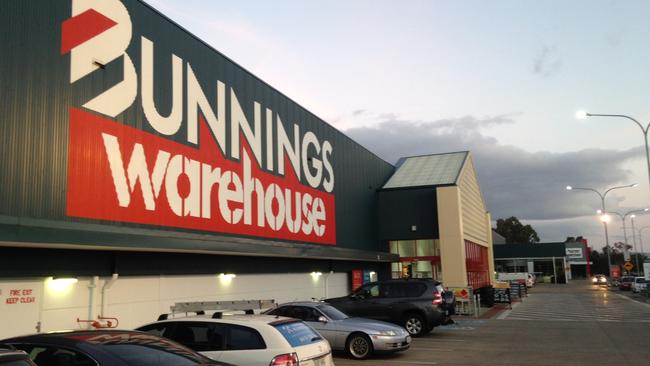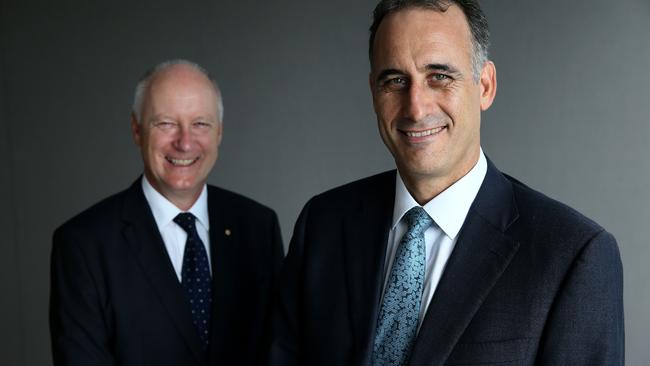‘Bunnings is selling a whole heap of generators’: Wesfarmers CEO weighs into energy debate
BLACKOUTS in South Australia are wreaking havoc on business, but for Bunnings there has been a surprising benefit.

BLACKOUTS in South Australia are wreaking havoc on business, but Wesfarmers boss Richard Goyder says there is a bright spot: Bunnings has been selling a lot of generators.
Mr Goyder made the wry comment while speaking to media following the release of Wesfarmers first-half results on Wednesday. But he said energy security amid the debate over renewables was a “serious issue”.
“One of the great things about being a conglomerate is usually we find an upside,” he said. “Bunnings is selling a whole heap of generators in South Australia at the moment. [But] it is a serious issue.
“Utility costs at Coles went up 14 per cent in the last half. That’s a material cost increase, we are worried about that and we are worried about certainty of supply. So we do think it’s a big deal.”
He didn’t specify sales figures, saying only that “I know we’ve been selling a lot more generators”.
Mr Goyder, who warned that there was a global “economic war” underway via taxation, currency and monetary policies of various countries, said Australia should be taking advantage of its “low-cost energy resources” to ensure its businesses are competitive.
He stressed the need for a cut in the corporate tax rate, saying Australia would pay a “big price” if it remained uncompetitive. In the US, Donald Trump has pledged to bring the corporate tax rate down from 35 to 15 per cent.
“I haven’t seen an alternative plan to grow the economy,” he said.
“I really worry about what’s going on in Canberra at the moment, where we can’t get decent fiscal savings through the Parliament, and there’s this notion that we can still keep taxing large businesses at 30 per cent and there are no consequences. There is a consequence for that.”
‘WORST FOR 30 YEARS’
On the performance of Coles, Mr Goyder said the grocery market was the weakest it had been for 30 years, and flagged further efficiency gains including reducing the number of items it stocks.
“I’d categorise Coles’ performance as strong,” he said. “This would be the weakest grocery market for 30 years, our major competitor has invested $1 billion in pricing, in that environment to have an underlying profit reduction of around 6 to 7 per cent when we’ve invested really heavily to maintain our price-competitive position, I think is a strong result.
“We’ve still got more efficiencies to get out of the business, [for example a] reduction in SKUs [stock keeping units], there are a number of things we think we can do to make the business more efficient and we will continue to invest those efficiencies in price and service.”
Coles stocks between 20,000 to 25,000 products, compared with around 2000 at Aldi.
Mr Goyder blamed the grocery market conditions on wage growth slowdown combined with a “challenging external environment”. “The vast majority of our customers are working class people, so that wage growth slowdown has an impact,” he said.
“You’ve had Brexit, you’ve had US elections, there seems to have been political uncertainty in Australia for some years now, things that are causing people to be fairly discerning on what they spend. Those factors are causing people to be cautious.
“Where we are positive about the future is population growth.” Mr Goyder said Wesfarmers was “really positive” about the medium- to long-term future of Coles. “It’s a business that generates good cash, we think there are growth opportunities [in fresh food].”

It comes after Wesfarmers earlier reported a 13.2 per cent increase in first-half profit to $1.58 billion, with a strong performance at Bunnings, Kmart and Officeworks offsetting struggles at Coles and Target.
Coles earnings decreased by 2.6 per cent to $920 million in the six months to December, while like-for-like food and liquor sales — which strips out store openings and closures — rose just 1.3 per cent, compared with 4.3 per cent in the prior corresponding period.
Target’s earnings fell by $58 million to $16 million, with revenue down 17.7 per cent, while Kmart grew revenue by 8.9 per cent and earnings by 16.3 per cent to $371 million.
“Kmart makes a lot of money and Target doesn’t,” Mr Goyder said.
“I think Guy Russo and Ian Bailey did an exceptional job of positioning Kmart as lowest prices and reduced the complexity of the range, went hard on product sourcing and really simplified the business, and we’re getting the rewards from that.
“Target is a much more complicated business, I would say it’s a more competitive market, if you think about what’s happened with new entrants particularly in women’s apparel and digital, and there is too much complexity in the business.
“[But] there are some pleasing aspects to the first-half results, certainly not sales, but we’ve already had a 40 per cent reduction in SKUs and we’re seeing some benefits from direct sourcing.”
Bunnings grew earnings by 9.8 per cent to $770 million, with revenue growth of 8.3 per cent, and store-on-store sales growth of 6.5 per cent, but its UK arm lost $48 million (£28 million) as it invests in rolling out the business.
Wesfarmers made the unexpected announcement that it was considering spinning off Officeworks, potentially via a stock market listing.
Mr Goyder wouldn’t be drawn on whether Wesfarmers was attempting to exit Officeworks before Amazon arrived in Australia. “We think it’s in a good market position with good market factors,” he said.
Citi warned of further deterioration in Coles’ food and liquor margins. “Shelf margin pressure drove an underlying food and liquor EBIT margin decline of 42 basis points, versus our expectations of a 16 basis point decline,” Citi analysts wrote.
Citi said margin pressure was expected to persist in the second half, but said there were there were potential upside risks including success of private label and direct sourcing.
“Private label sales are modest at Coles and the company plans to expand the offer significantly. In addition, the non-food businesses may further increase direct sourcing from China.”




